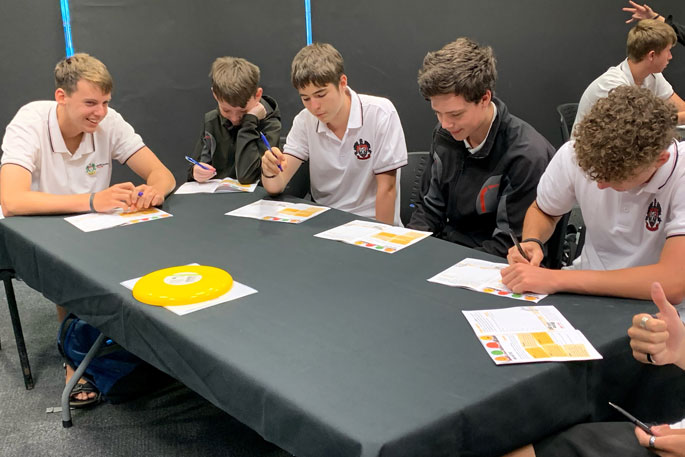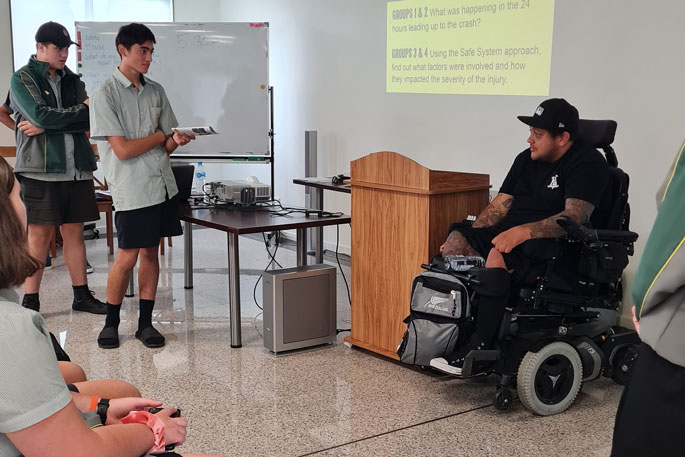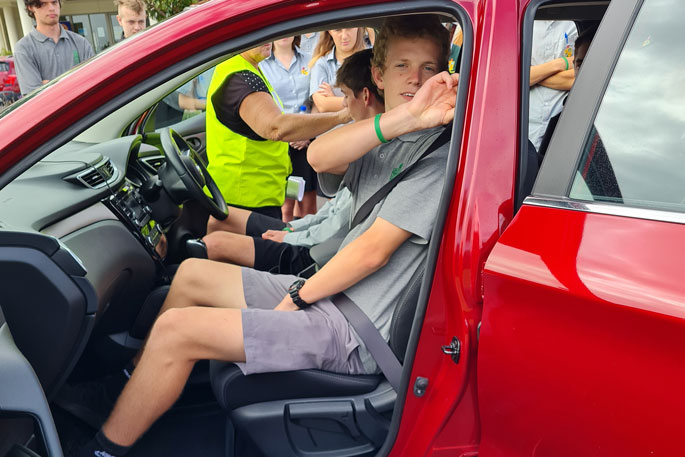We see it in the news almost daily. Accidents, injuries and deaths on our roads are a significant issue, one exacerbated by an ever-increasing number of vehicles and the many regional state highways and rural roads in our region.
But for young people, there is an even greater risk.
Getting behind the wheel of a car as a young driver or being a young passenger with a novice driver is said to be the most dangerous thing that a person will do in their life.
There are many reasons for this.
For young drivers still learning, lack of experience and a frontal cortex that is not yet fully developed leads to more risks taken on the road.
Each year, male drivers in the 15–19-year age group are about eight times more likely to crash than male drivers in the lowest risk age group of 55–59 years, and female drivers aged 15–19 are about six times more likely to crash than female drivers in the lowest risk group of 45–49-year-olds.
Road Safety Education is a charity hoping to put a stop to youth road trauma.
Its RYDA programme has been running in the Western Bay of Plenty since 2019, and is being rolled out to over 500 Year 12 students across the region this year.
RYDA features a highly engaging and memorable workshop that provides students with the tools, habits and motivation to take action and stay safe on our roads.
The workshops are delivered by a range of specialists, including New Zealand Police, and involve six sessions as well as a suite of resources schools can use both pre and post the workshops back in the classroom that cover a broad range of road safety lessons.
From road risk factors such as speed, following distance and distractions, to car safety features, hazard perception, and the role of personality and mind-state, all sessions are interactive with role play, interviews, and group work.
While RYDA isn't a licensing programme, it works well with them, and is designed for all students whether they are driving yet or not.
 Mount Maunganui College students at a RYDA workshop.
Mount Maunganui College students at a RYDA workshop.
The programme provides education essential to supporting on-road driving practice. It speaks with teens in their peer groups, helps them devise strategies to mitigate the challenges they face, and develops critical cognitive thinking as both drivers and passengers to help with decision-making.
Feedback from the programme shows students take a lot from the sessions.
One Mount Maunganui students says the personality test was particularly eye-opening.
'The results were actually quite surprising because the areas which I thought I was good at like 'knowing yourself' actually ended up being my lowest score.
'It was really eye-opening and especially to see the things I thought I was bad at like 'speaking up' I actually came out with a pretty good score.
'I know I can use this session and this personality test for my driving in the future because I'll be able to work on my weaknesses in driving, such as having more self control. So although I do not have my Learners yet I will definitely carry this information with me to help me be a better driver.”
Road Safety Education national manager Maria Lovelock says the programme's focus is solely on road safety.
'We're creating an experience that will stick with these young people for the rest of their lives.
'Students have a lot of fun as all the sessions are interactive, and there's also plenty of lightbulb moments as they learn about the many facets that affect their driving and safety on the roads.
'A lot of what we do is all around that critical thinking and decision making, getting students to understand things like how different moods affect their driving, or how even talking hands-free on the phone affects their peripheral vision.”
Maria says there is currently a focus from several Government departments to fast-track driver licensing while students are still at school, in order to help young people access work.
'While access to work and preventing isolation are important factors to a young person's overall wellbeing, we are extremely concerned that pushing young people through their driver licensing tests without teaching them critical thinking, planning and resilience, or giving them good strategies to stay safer on our roads, will ultimately increase our road toll.
'It is crucial that while schools encourage our young people to get their license, RSE are alongside this to help students understand their personal risk profile.”
With facilitators, venue hire, workbooks, programme development, travel expenses and more, the programme costs around $11,000 to run for a day.
 Students take part in the Crash Investigation session at part of RYDA.
Students take part in the Crash Investigation session at part of RYDA.
Road Safety Education applied for funding from TECT to help cover operating costs to deliver the programme to three schools in the Western Bay of Plenty.
Maria says the $5000 in TECT funding received makes a huge difference.
'TECT's funding is incredibly important, we wouldn't be able to run the programme here without it. When we first piloted the programme in Tauranga, the local Rotary Clubs funded it all. They paid for the buses, venue, everything – but it wasn't sustainable.
'TECT's funding helps us keep the cost down for schools. It costs us $53 a head, and schools here are paying about $10 a head.
'We really appreciate that TECT sees the long-term value of what we are doing here; it is young people being safer on the roads and ultimately lives saved.”
To learn more about Road Safety Education and the RYDA programme, visit https://rse.org.nz/



3 comments
WHAT???
Posted on 25-05-2021 11:36 | By Yadick
This sounds like a great program and if it's working that's even better however $11000.00 per day to run it to me seems way over the top . . .
Great program....
Posted on 25-05-2021 12:36 | By The Professor
.....but I agree with Yadick - the costs seem rather high. Yadick and I will run it for half the cost :-)
@ The Professor
Posted on 26-05-2021 13:08 | By Yadick
Hahaha, count me in.
Leave a Comment
You must be logged in to make a comment.